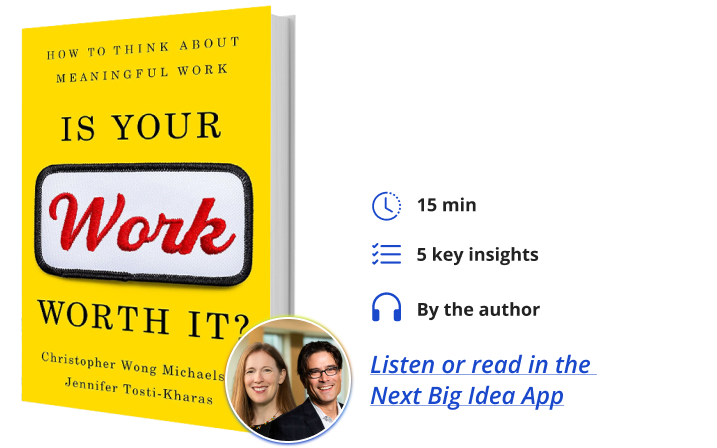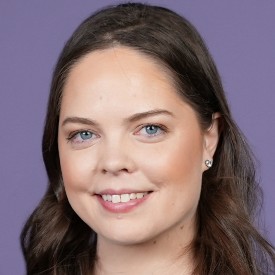Christopher Wong Michaelson is a philosopher with 25 years of experience advising business leaders pursuing meaning and providing work with a purpose. He is the Opus Distinguished Professor and Academic Director of the Melrose and The Toro Company Center for Principled Leadership at the University of St. Thomas. He is on the Business and Society faculty at NYU’s Stern School of Business.
Jennifer Tosti-Kharas is the Camilla Latino Spinelli Endowed Term Chair and Professor of Management at Babson College.
Below, co-authors Christopher and Jennifer share five key insights from their new book, Is Your Work Worth It?: How to Think About Meaningful Work. Listen to the audio version—read by Christopher and Jennifer—in the Next Big Idea App.

1. One Life to Live.
It turns out that after 43 years on network television, One Life to Live did have one more life to live, this time on a streaming service. But that second life was to be brief, indicating that, in fact, we do have but one life to live after all. So we might as well use our limited time wisely.
For most of us, work will take a disproportionate share of our waking adult hours. It defines our identities, especially in a culture where the first question we often ask when meeting someone is, “What do you do?” Work shapes our legacies: the mark we leave behind by what we produced, who we influenced, and what it all meant. Yet, most of us don’t have enough time in the workday to pause working to ask the big questions about why we do the work we are doing unless we are faced with a tragedy that forces us to confront our own mortality.
Most of the victims of the 9/11 terrorist attacks died at work, and though they ranged in age, they were, on average, in their late 30s. Their stories suggest that we may have but one life to live, but also that we may have many working lives to discover work that is worth it. Godwin Ajala had been a lawyer in Nigeria before taking a position as a security guard at the World Trade Center while studying for the bar exam and earning money to bring his family to the United States. Brooke Jackman was a bond trader preparing to get a graduate degree in social work because she “decided there were more important things in life than making money.”
Both 9/11 and COVID-19 claimed victims from all points on the socioeconomic spectrum. One difference is that around half of American COVID victims were past the typical retirement age in the United States, yet their deaths were nonetheless tragic. The stories that reflected back on their careers were rarely straightforward. They included immigrant meatpackers trying to build a better life and nurses who prioritized patients at their own peril. Every one of these stories is about a life that was all too short. They all remind us that if we are fortunate enough to be able to choose what we do for a living, we examine for whom and why our work matters.
2. Days of Our Lives.
This show has had its high points and low points. The highs include its reputation as television’s most daring drama in the 1970s when it addressed then-controversial issues like interracial marriage. The lows? They include bringing back characters from the dead—one of them four times—which tanked reviews but boosted ratings. This apparent paradox is not unlike that which afflicts many workers in modern times, when our happiness reaches its lowest point in the same years that earning power peaks.
Kathleen Gluck hit the lowest point of her life after she’d achieved the goal she had dreamed of since growing up in the shadow of a father who was a successful partner in a New York law firm. She had decided after college that the law was not for her, but partnership was, and she was admitted to the exclusive club in a Big Four accounting firm when she was just 37 years old and had young children at home.
“Our happiness reaches its lowest point in the same years that earning power peaks.”
If the economic value of our work defines our social status and sense of self-worth in society at large, it’s even more about the money at a firm founded by accountants trained to believe that everything that counts can be counted. Kathleen remembers that “there were daily reminders of [her] lack of value” and feeling that “[her] worth as a human was tied to what [she] produce[d].” She sat down one Thanksgiving to write her suicide note before resolving she wasn’t willing to die for her job. She got professional help and, thankfully, support from her fellow partners, who encouraged her to take time off.
Never one to shy away from a challenge, Kathleen returned to the partnership, got a Ph.D. on the side, and chose to pursue some new professional adventures. But her story is a reminder that not everyone will emerge from the mid-career lows unscathed. It reminds us to ask: How should we plan and prioritize our working time to support our well-being at every stage of our lives?
3. General Hospital.
Unlike most soap operas, the setting of this one is a workplace; however, the plotlines tend to be more about the patients than the providers. In one story, the victim of a bus crash saves the life of a patient needing a kidney transplant. In another, a patient dies from complications from AIDS, earning the show accolades for public health education.
Our preference for stories about life away from work is probably associated with the old cliché that “nobody on their deathbed ever wishes they had worked more.” But that is not necessarily true of people whose work is worth it. People who are fortunate to find their calling at work not only tend to report higher job satisfaction but life satisfaction as well.
Apropos of the theme of General Hospital, the healthcare workers we talked to demonstrated characteristic romantic markers of work as a calling. The calling was feeling a sense of destiny about their work as a worthy end they would rather pursue than anything else. Without their work, their existence would be less meaningful. They included Muri Raifu, who, when he was on scholarship from Ghana, got used to working three jobs while studying as a college student. Working two jobs as an adult is second nature to him. His first profession was as a neurosurgeon, and he used his earnings from that career to help finance a medical technology company that digitizes records to give patients greater control over their healthcare on his native continent.
Healthcare is one of the prototypical calling-driven professions. These stories help to explain why work as a calling may be disproportionately represented in the so-called helping professions. But they can also inspire us to make a change when we feel stuck in work that is not worthy of us.
4. The Young and the Restless.
Unfortunately, “Do what you love, and you’ll never work a day in your life” is, at best, easier said than done and, at worst, simply false. The downside of work as a calling can lead to a life of overwork, underpay, and exploitation. The potential romance of loving your work probably leads a lot of young entrants to the workforce to feel excessive pressure to find their callings. It can also contribute to mid-career restlessness among those who are still searching.
As a case in point, The Young and the Restless spawned the careers of Eva Longoria, David Hasselhoff, and Tom Selleck, probably leading legions of other actors to wish the same for themselves. But most of those on the show didn’t make it big.
Chasing work as a calling all too often ends unhappily. Paul Gauguin was a French modernist painter who left the life of a stock trader to become a painter, abandoning his family in the process. One of his artworks would eventually set a record for the most expensive canvas ever sold at auction, but only after he died was his work recognized by the market. Jen and another one of her coauthors, Shasa Dobrow, a concert bassoonist, studied musicians who dreamed of making it big when they were young. Having a calling in music leads many musicians to systematically overrate their own talent relative to the evaluations of objective experts. They then ignore the well-meaning advice of their teachers, who advise them not to enter music professionally and set themselves up for years of restlessness and unfulfilled callings.
“Chasing work as a calling all too often ends unhappily.”
Of course, as we have already noted, working as a calling has both upsides and downsides, leading researchers to refer to it as a double-edged sword. Our conclusion is to resist the unrealistic pressure to “do what you love.” It’s okay not to love your work every day but instead to seek work that’s worth loving. Seek work that contributes to society, provides for your family, and makes possible life at work and beyond work.
5. Guiding Light.
All of these soap operas have stayed on the air for a long time, but Guiding Light was the most enduring. Guiding Light had a 72-year run that started on the radio in 1937 and continued on television until 2009. The title’s guiding light was originally imbued with religious imagery, referring to the lamp in the office of Reverend John Ruthledge, to whom people went for help with their problems.
These origins are appropriate since the classical notion of work as a calling comes from God. More recently, a secularized notion of calling has emerged to refer to personally fulfilling and/or socially valuable work. What all these conceptions of calling have in common is that work can be one of our guiding lights toward leaving a meaningful mark on the world, a lasting legacy that endures after we are gone.
Robert Guest could not care less about leaving a legacy. When we spoke with him, Robert was sitting in a car that he rents on Turo—think Airbnb for automobiles—a source of passive income that he lives on, combined with income from a part-time job as a street sweeper and disability payments from his time in the military. He looks back wistfully on his deployment in Afghanistan when he felt he was doing some good in the world, but for the most part, he thinks work is a waste of people’s time—a search for stability that too often results in boredom in a life meant for adventure. He was preparing to drive the converted school bus he currently lives in down the Pan-American Highway to Costa Rica, where he will park it on a beach. His dream is to be kidnapped by pirates, the ultimate sign that his life was well-lived, far from the workaday existence of his peers.
Should we care about leaving a legacy through our work? On the one hand, being overly concerned with your legacy seems egocentric but speaks to many human beings’ primal fear of oblivion. On the other hand, to be unconcerned with your legacy seems nihilistic about the possibility of enduring meaning. Worthy work has the potential to be one of the most important contributions we make to the world, so thinking about the legacy your work will leave can be the guiding light to help you imagine work that is worth doing in a life worth living.
To listen to the audio version read by co-authors Christopher Wong Michaelson and Jennifer Tosti-Kharas, download the Next Big Idea App today:































